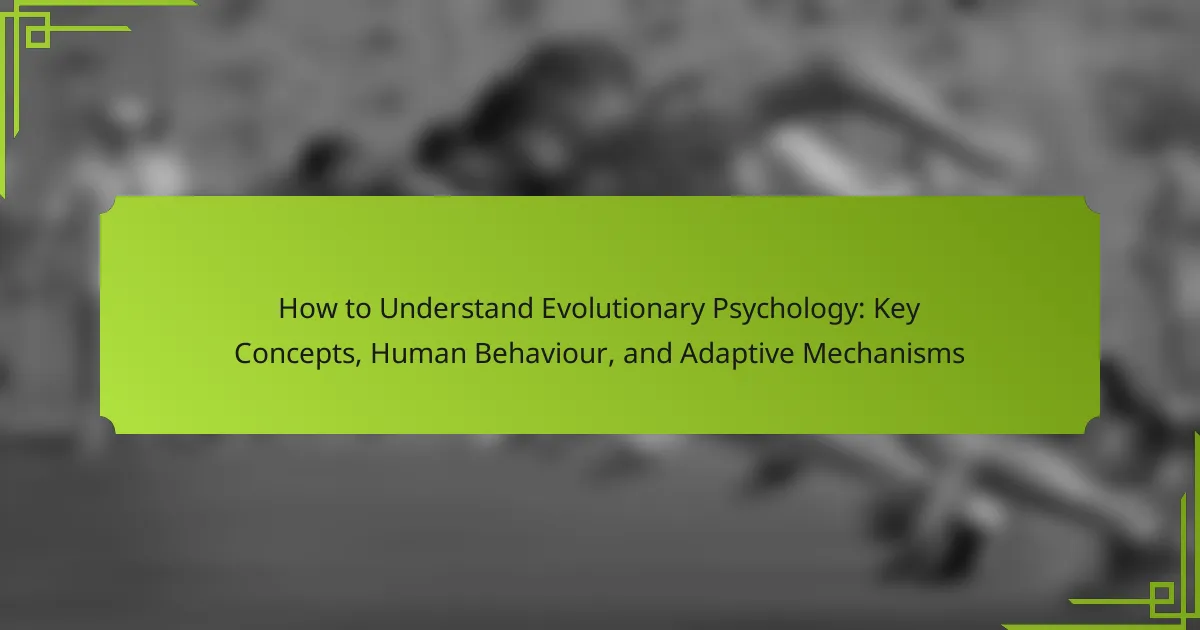Understanding evolutionary psychology can illuminate the reasons behind human behaviour and enhance personal relationships. This article explores key concepts such as adaptive mechanisms, the influence of natural selection, and the role of ancestral environments. It also examines universal human traits and their implications for social dynamics and decision-making. By applying these insights, individuals can improve self-awareness and navigate relationships more effectively.

What are the foundational concepts of Evolutionary Psychology?
Evolutionary psychology focuses on understanding human behaviour through the lens of evolution. Key concepts include the adaptive significance of behaviours, the influence of natural selection, and the role of ancestral environments in shaping modern psychological traits.
Adaptive mechanisms explain how certain behaviours enhance survival and reproduction. For example, social behaviours may have evolved to foster cooperation and group living, which are advantageous for resource sharing and protection.
Unique attributes of evolutionary psychology involve examining universal human traits, such as fear responses and mating strategies, which reflect our evolutionary past. These traits demonstrate how psychological processes are rooted in our biology and ancestry.
Overall, evolutionary psychology provides insights into the complexities of human behaviour, highlighting the interplay between our genetic inheritance and environmental influences.
How does Evolutionary Psychology explain human behaviour?
Evolutionary psychology explains human behaviour as a result of adaptive mechanisms shaped by natural selection. It emphasizes that many psychological traits are evolved responses to environmental challenges. Key concepts include mate selection, kinship, and social behaviour, all reflecting survival and reproductive advantages. For example, altruism can be understood as a strategy to enhance the survival of related individuals, thereby ensuring gene propagation.
What are the adaptive mechanisms in human evolution?
Adaptive mechanisms in human evolution include traits that enhance survival and reproduction. These mechanisms, such as social cooperation, problem-solving abilities, and communication skills, have shaped human behaviour and psychology. For example, the development of empathy has fostered group cohesion, aiding in survival. Additionally, the ability to adapt to environmental changes has been crucial for human populations. Understanding these mechanisms provides insight into the complexities of human behaviour and social structures.

What are the universal attributes of Evolutionary Psychology?
Evolutionary psychology is characterized by universal attributes that explain human behaviour through the lens of evolution. These attributes include the adaptation of psychological traits, the influence of natural selection, and the universality of certain cognitive processes across cultures.
Key concepts include the focus on innate behaviours, the role of environment in shaping these behaviours, and the understanding of psychological mechanisms as evolved responses to ancestral challenges. Additionally, evolutionary psychology emphasizes the importance of reproductive strategies and social dynamics in shaping human interactions and decision-making.
These attributes collectively provide insights into why humans exhibit specific behaviours and how these behaviours have been shaped over time to enhance survival and reproduction.
How do natural selection and survival influence behaviour?
Natural selection and survival significantly shape behaviour by favouring traits that enhance reproductive success. These behaviours often manifest in social interactions, resource acquisition, and mating strategies. For instance, cooperation can increase group survival, while aggression may secure resources. Evolutionary psychology suggests these adaptive mechanisms are rooted in ancestral environments, influencing modern human behaviour. Understanding this connection reveals how instinctual responses are shaped by survival needs, impacting decision-making and social dynamics.
What role does mating strategy play in human psychology?
Mating strategy significantly influences human psychology by shaping behaviours and social dynamics. It determines attraction, relationship formation, and parental investment, reflecting adaptive mechanisms evolved for survival. For example, short-term mating strategies may prioritise physical attractiveness, while long-term strategies emphasise emotional connection and stability. This variation in mating strategies illustrates the root attribute of evolutionary psychology, highlighting how human behaviour is influenced by biological imperatives. Understanding these dynamics provides insight into interpersonal relationships and societal structures.

What are the unique attributes of Evolutionary Psychology?
Evolutionary Psychology uniquely attributes human behaviour to adaptive mechanisms shaped by natural selection. Key aspects include the emphasis on innate psychological traits, the role of evolutionary pressures in shaping social behaviours, and the understanding of cognitive processes as evolved solutions to ancestral challenges. These attributes highlight how human psychology is influenced by the need for survival and reproduction.
How do cultural factors integrate with evolutionary principles?
Cultural factors shape human behaviour through evolutionary principles by influencing social norms and adaptive strategies. These factors enhance survival by promoting cooperation and resource sharing. For example, cultural practices can facilitate group cohesion, which is essential for collective survival. Additionally, cultural evolution can lead to unique adaptations that reflect environmental challenges, illustrating the interplay between culture and biology.
What is the significance of kin selection in social behaviour?
Kin selection significantly influences social behaviour by promoting altruistic actions among genetically related individuals. This evolutionary mechanism enhances the survival of shared genes, fostering cooperation within groups. For example, helping relatives increases the likelihood of passing on genetic traits. As a result, kin selection shapes social structures in various species, including humans. Understanding this concept reveals the adaptive mechanisms driving human behaviour and social dynamics.

What are the rare attributes of Evolutionary Psychology?
Evolutionary psychology has rare attributes that distinguish it from other psychological theories. These include a focus on innate behavioural tendencies, the role of ancestral environments in shaping modern behaviour, and the integration of biological and cultural factors in understanding human actions. Additionally, evolutionary psychology emphasises the universality of certain psychological traits across different cultures, suggesting a shared human heritage. It also explores the adaptive significance of emotions and cognitive processes in survival and reproduction.
How do evolutionary mismatches affect modern behaviour?
Evolutionary mismatches can lead to maladaptive behaviours in modern humans. These mismatches occur when our ancestral traits do not align with contemporary environments, resulting in stress, anxiety, and unhealthy lifestyle choices. For instance, our craving for high-calorie foods, beneficial in scarcity, becomes detrimental in abundance. This disconnect illustrates the unique attribute of evolutionary psychology, where inherited traits influence current behavioural patterns. Understanding these mismatches helps clarify modern human behaviour and highlights the need for adaptive mechanisms to address contemporary challenges.
What insights can we gain from studying evolutionary psychology in specific populations?
Studying evolutionary psychology in specific populations reveals insights into adaptive behaviours and cultural variations. These insights help understand how environmental factors shape psychological traits. For instance, certain traits may be more pronounced in populations facing specific survival challenges. This highlights the unique attributes of human behaviour influenced by evolutionary pressures. Additionally, examining diverse populations allows for comparisons that enhance our understanding of universal versus culture-specific psychological mechanisms. Such studies underscore the importance of context in shaping psychological adaptations.

How can understanding Evolutionary Psychology improve personal relationships?
Understanding evolutionary psychology can enhance personal relationships by revealing innate behaviours and motivations. This perspective helps individuals recognise patterns in attraction, communication, and conflict resolution. For example, understanding mate selection criteria can improve compatibility and emotional connections. Additionally, recognising the role of evolutionary adaptations in social dynamics fosters empathy and effective communication. By applying these insights, individuals can navigate relationships more successfully, leading to healthier and more fulfilling interactions.
What strategies can enhance communication based on psychological principles?
Effective communication can be enhanced by applying psychological principles such as active listening, empathy, and clarity. Active listening fosters understanding by ensuring that all parties feel heard. Empathy allows communicators to connect on a deeper level, making interactions more meaningful. Clarity in messaging reduces misunderstandings and promotes effective exchanges. These strategies align with evolutionary psychology, emphasising the adaptive mechanisms that enhance social bonds and cooperation. By focusing on these principles, individuals can improve their communication skills significantly.
What common misconceptions should be avoided in applying Evolutionary Psychology?
Common misconceptions in applying Evolutionary Psychology include oversimplifying human behaviour as purely instinctual, ignoring cultural influences, and assuming that all traits are adaptive. These misunderstandings can lead to misinterpretations of human actions and social dynamics. Acknowledging the interplay between biology and environment is crucial for a comprehensive understanding. Additionally, it’s important to recognise that evolutionary explanations can evolve over time, reflecting new research and perspectives.

What are the best practices for applying Evolutionary Psychology in everyday life?
Applying Evolutionary Psychology in everyday life involves understanding human behaviour through the lens of adaptive mechanisms. Focus on self-awareness, social interactions, and decision-making processes to enhance personal growth and relationships.
1. Cultivate self-awareness by recognising innate biases and behaviours shaped by evolution.
2. Improve social interactions by understanding the evolutionary roots of empathy and cooperation.
3. Make informed decisions by considering the adaptive significance of choices in modern contexts.
4. Foster resilience by embracing challenges as opportunities for growth, reflecting evolutionary survival strategies.
How can individuals use evolutionary insights for personal development?
Individuals can leverage evolutionary insights to enhance personal development by understanding behavioural patterns and adaptive mechanisms. Recognising that many human behaviours stem from evolutionary pressures allows individuals to identify their innate tendencies and how these impact their decision-making.
For instance, awareness of the fight-or-flight response can help in managing stress and anxiety. By understanding social hierarchies and group dynamics, individuals can improve their interpersonal relationships and communication skills. Additionally, recognising the evolutionary basis for certain fears can guide individuals in overcoming them.
Emphasising self-awareness and reflection, individuals can align their personal goals with their evolutionary predispositions, fostering growth and resilience. This approach encourages a deeper understanding of oneself, leading to more effective personal development strategies.
What optimisation tips can enhance interpersonal dynamics?
Understanding evolutionary psychology can enhance interpersonal dynamics by fostering empathy, improving communication, and recognising behavioural patterns. These strategies help individuals navigate social interactions effectively.
1. Develop empathy by considering evolutionary triggers behind emotions and reactions.
2. Enhance communication skills by understanding non-verbal cues rooted in human evolution.
3. Recognise behavioural patterns influenced by adaptive mechanisms, facilitating better conflict resolution.
4. Foster cooperation by aligning goals with evolutionary advantages of group dynamics.
What expert insights can guide effective application of these concepts?
Expert insights can enhance the application of evolutionary psychology concepts by emphasising their relevance to modern human behaviour. Understanding adaptive mechanisms provides clarity on motivations behind actions. For instance, recognising the role of survival instincts can guide effective communication strategies. Additionally, integrating interdisciplinary research strengthens the foundation of these concepts, offering a comprehensive view of human interactions. Emphasising the unique attribute of evolutionary psychology as a lens for interpreting social dynamics can lead to more effective applications in various fields, including marketing and education.
